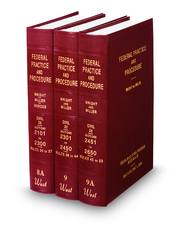
District Courts
The district courts are the primary trial court for federal cases. Washington has two federal district courts: (1) the Eastern District has courthouses located in Spokane, Yakima, and Richland and (2) the Western District has courthouses located in Seattle and Tacoma.
Each court's website include links to information about the courts including biographies of judges, forms, and copies of local court rules.
Appellate Court
Appeals from the Eastern District and Western District district courts go the Ninth Circuit Court of Appeals, along with appeals from eight other states and the territories of Guam and the Northern Mariana Islands. The Ninth Circuit's website has information including forms, rules, and practice guides.
 Federal Practice and Procedure
Federal Practice and Procedure
 Moore's Federal Practice
by
James W. Moore
Moore's Federal Practice
by
James W. Moore
The U.S. Courts website provides links to the following Current Rules of Practice and Procedure:
*Annotated versions of the Federal Rules of Appellate Procedure, Federal Rules of Civil Procedure, Federal Rules of Criminal Procedure, and Federal Rules of Evidence are published in the USCS and USCA. You can access the USCA through Westlaw, and the USCS through Lexis.
The Federal Rules of Appellate Procedure govern procedure in the United States courts of appeals.
The Federal Rules of Bankruptcy Procedure govern procedures for bankruptcy proceedings.
The Federal Rules of Civil Procedure govern civil proceedings in the United States district courts. Their purpose is "to secure the just, speedy, and inexpensive determination of every action and proceeding." Fed. R. Civ. P. 1.
The Federal Rules of Criminal Procedure govern criminal proceedings and prosecutions in the U.S. district courts, the courts of appeals, and the Supreme Court. Their purpose is to "provide for the just determination of every criminal proceeding, to secure simplicity in procedure and fairness in administration, and to eliminate unjustifiable expense and delay." Fed. R. Crim. P. 2.
The Federal Rules of Evidence govern the admission or exclusion of evidence in most proceedings in the United States courts.
Generally, the Rules Governing Section 2254 Cases in the United States District Courts govern habeas corpus petitions filed in a United States district court pursuant to 28 U.S.C. § 2254 by a person in custody challenging his or her current or future custody under a state-court judgment on the grounds that such custody violates the Constitution or laws or treaties of the United States. The Rules Governing Section 2255 Proceedings for the United States District Courts govern motions to vacate, set aside or correct a sentence filed pursuant to 28 U.S.C. § 2255. Such motions must be filed in the sentencing court by a person in custody attacking the sentence imposed on the ground that the sentence was imposed in violation of the Constitution or laws of the United States, that the court was without jurisdiction to impose such sentence, or that the sentence was in excess of the maximum authorized by law, or is otherwise subject to collateral attack.
Federal Reporter: reported decisions of the U.S. Courts of Appeals
Federal Supplement: reported decisions from U.S. District Courts
Federal Appendix: opinions from newsworthy Court of Appeals cases not designated to be published as precedent.
Subscription Databases:
U.S. federal court opinions can be accessed through subscription databases:



Free Sources for Searching U.S. Federal Court Decisions
Many Supreme Court and Circuit Court opinions, and more limited district court opinions, can also be accessed through a variety of free resources, including those below. Please be aware of date restrictions on publications within each resource.
Practitioners may need access to court documents and the documents filed in court.

Form books are useful in drafting pleadings, motions, orders and other court documents. There are many resources that contain federal procedural forms. Some are arranged by rule number, others topically.
 Bender's Federal Practice Forms
by
Louis R. Frumer, Marvin Waxner
Bender's Federal Practice Forms
by
Louis R. Frumer, Marvin Waxner
 West's Federal Forms
West's Federal Forms
 American Jurisprudence Pleading And Practice Forms Annotated
American Jurisprudence Pleading And Practice Forms Annotated
Seattle University Law Library
901 12th Avenue | Seattle, WA 98122 | 206-398-4220
Law Library | Research Guides | About Us